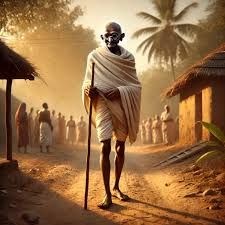
27-Mar-2025 , Updated on 3/27/2025 7:34:02 AM
What are the dark secrets of Mahatma Gandhi ?
Gandhi’s Controversial Celibacy Experiments
The sleeping naked with young women tests of Gandhi’s extreme celibacy are serious ethical issues. These experiments, he said, were spiritual challenges but constituted abuse over power dynamics and did not have consent. Blurring moral boundaries was one of his grandnieces, Manu Gandhi. This behavior was widely held to be bordering on psychological manipulation dressed up as self discipline. While Gandhi advocated for purity, his means were indecent and hypocritical, and contrary to his public portrayal. Such actions undermine his moral authority, and on a troubling side of his personal life many biographers ignore.
Racist Views in Early Life
While he was in South Africa, Gandhi showed racist attitudes toward Black Africans. He favoured the rights of Indians as opposed to Blacks and used derogatory terms like 'kaffir'. It is to be noted that one of his activist focuses was to raise Indians above Africans, so that the colonial hierarchies were reinforced. However, these writings contradict the view of him as a universal equality champion in his latter image. For Gandhi’s racism to be acceptable is now exposed as hypocrisy, since while people evolve, Gandhi’s early racism is a stain on his legacy. A true humanitarian doesn’t only fight for his own oppressed groups, but for the others as well.
Harsh Treatment of His Wife
Gandhi’s marriage to Kasturba was characterized by control and neglect. Equally strict he enforced celibacy regardless of her consent, as well as his ideals over her well being. Under pressure, he relented when she became seriously ill and resisted modern medicine. His mastery over her defeats his preachings on equality but does not in any way reflect his preachings of equality. Such a leader should have practiced compassion towards the members of his own family first. Gandhi’s lack of character is shown through Kasturba who suffers.
Political Manipulation & Hypocrisy
Gandhi’s political strategies included a lot of moral grandstanding and dubious compromises. In Chauri Chaura, he suddenly suspended the Non Cooperation Movement, exposing his supporters to British repression. Opponents were pressured emotionally to the point of being coerced to fasts unto death by his fasts unto death. Always advocating nonviolence, he supported violent protests when it suited him. He constantly switched sides on caste reform; sometimes he supported it, sometimes he criticized it, and each cropped up at the height of political opportunism. Gandhi was a true leader, but sometimes Gandhi made the choice of control over justice, which showed that there was a manipulative side to his saintly facade.
Selective Advocacy for Lower Castes
Gandhi had a problem with untouchability but upheld the caste system's framework, labelling it a 'divine order'. He was patronizing in his term ‘Harijan’ (children of God). Gandhi wanted caste reform, which was gradual, while Ambedkar called for annihilation of the caste system. The fight of equality was weakened by his reluctance to challenge Brahminical dominance. While he promoted Dalits to movements, his view was restricted by Hindu orthodoxy. A true egalitarian would have abhorred the concept of caste, but Gandhi’s half-hearted effort to dismantle oppression demonstrates a leader who was afraid to take action but preferred to take a symbolic stand.

Content Writer
Hi, I’m Meet Patel, a B.Com graduate and passionate content writer skilled in crafting engaging, impactful content for blogs, social media, and marketing.
Join Our Newsletter
Subscribe to our newsletter to receive emails about new views posts, releases and updates.
Copyright 2010 - 2026 MindStick Software Pvt. Ltd. All Rights Reserved Privacy Policy | Terms & Conditions | Cookie Policy